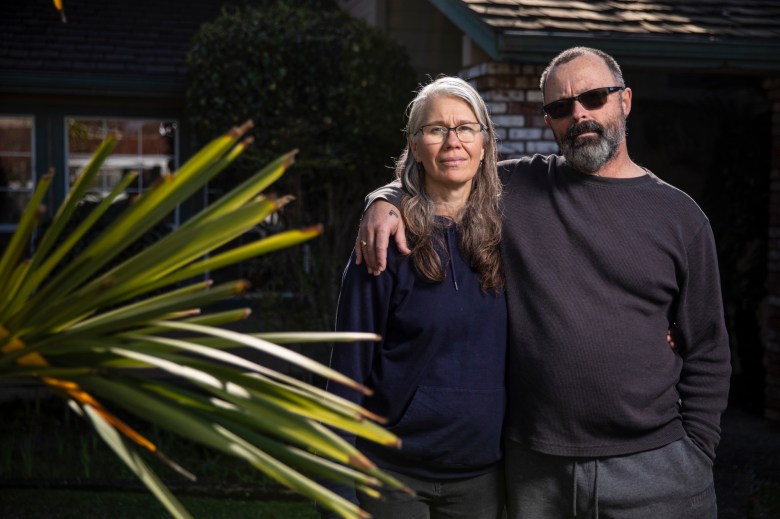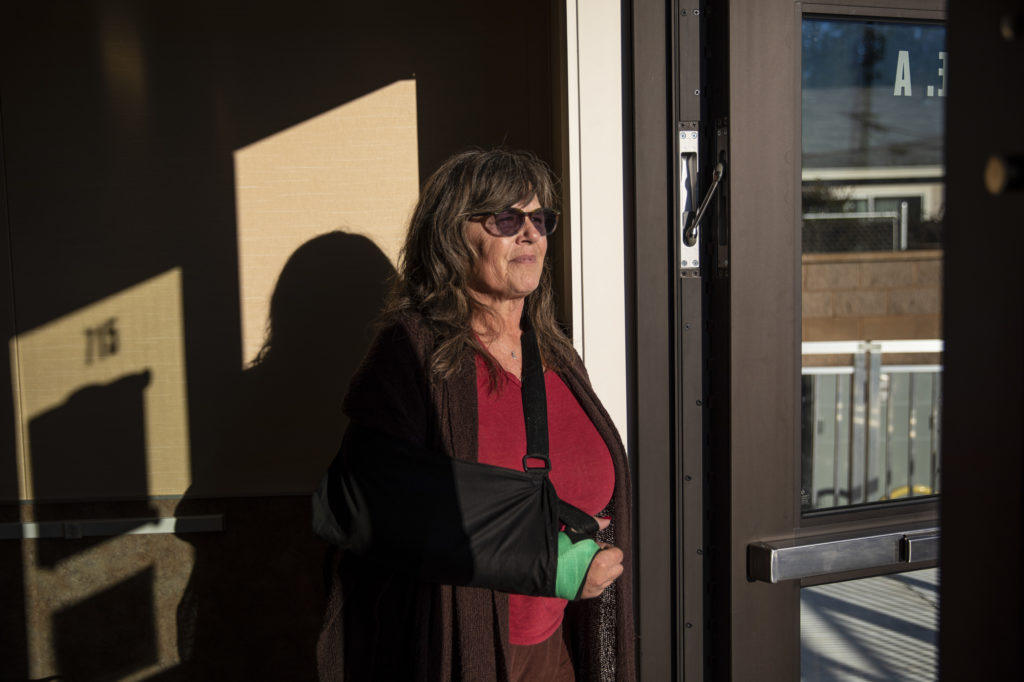GARBERVILLE — Leann Greene’s rose-colored glasses are scratched, cracked, sitting askew, but still firmly planted on her face during her latest monthly open house for the Humboldt Workforce Coalition.
For three hours this Wednesday afternoon in a sunny conference room at the public library, apprehensive cannabis workers, lured by a segment on the community radio station KMUD, trickle through, seeking a potential refuge from their collapsing industry. Greene is their counselor and confidante, a relentless cheerleader promoting new career opportunities.
“So dream big. It’s your life, right?” she tells one young man looking for help connecting to job possibilities in a place where there don’t seem to be many right now.
It’s a mantra for Greene.
“You’re kind of reinventing your life here, so dream big,” she tells Daniel Rivero, who fears he could lose his job at any moment after his hours were cut back at the small warehouse where he manufactures cannabis products for $17 an hour.
A crash in the price of weed over the past two years has sent California’s cannabis market reeling — and with it, the communities that relied economically on the crop for decades, even before the “green rush” of commercial legalization.
In the Emerald Triangle — the renowned Northern California region of Humboldt, Mendocino and Trinity counties that historically served as the hub of cannabis cultivation for the state and the country — growers who can no longer sell their product for enough to turn a profit are laying off employees and shuttering their farms. The cascading financial impacts have left local residents with broken dreams and a daunting question: If not cannabis, then what?
“We just need to reassess this whole situation as a community of what we can do to evolve with it instead of trying to go against it,” Rivero said.



The 39-year-old, who has lived in Garberville for more than a decade, earned his solar installation certification a few years back, but never bothered to pursue it because the pay would have been lower than what he could make in cannabis. Now he’s trying to put other options back on the table, even as he hopes that he can just hold on until the market stabilizes.
“I’m more the school of thought you go for what your heart tells you,” said Rivero, who like so many others around here, believes that cannabis is more than a profession, it’s a culture that provides medicine for people. “So I think if I can hold out as long as I can, I would, where it’s not affecting my health or my well-being because of my financial situation.”
“Do you keep on struggling or do you go for something that’s more secure?”
Cannabis has been king in this rural area of northern California. But as prices plummet, communities and business owners are hurting, with no clear solutions in sight. Many blame Proposition 64 for undermining small growers.
That’s the increasingly urgent dilemma for residents of the Emerald Triangle, in the cannabis industry and beyond.
Weed has flourished here for more than half a century, from its seeds as a countercultural back-to-the-land movement in the 1960s to the predominant economic engine of today.
Prime weather and remote locations made it a great place to grow cannabis, while the illegal nature of the business made it highly lucrative. A whole other world — independent but insular, secluded but self-sustaining — developed in communities such as Garberville, a hippie town of about 800 people along the Eel River and Highway 101 near the southern edge of Humboldt County.
“Out here, we’re like an island,” said Anson Wait, a server who estimates that he has lost three-quarters of his income in recent months as the local restaurant industry has been wiped out.

It’s hard to quantify just how central cannabis is to local life, but one academic study more than a decade ago projected that the industry was responsible for at least a quarter of all economic activity in the county. The figure is assuredly far higher in southern Humboldt, where the majority of growers are based.
That reliance on cannabis was once a windfall to a rural expanse without many major commercial sectors, supporting main street boutiques and the sports program at the local high school. But it has also made the region particularly vulnerable to the downturn since California voters legalized recreational use and sales in 2016 with Proposition 64.
With the nascent licensed cannabis market unable to absorb a surplus of product, prices have tumbled over the past few years to a fraction of their former highs — a few hundred dollars for a pound of weed that would have sold for more than $1,000 a couple of years ago. Disappearing profits for growers means there’s simply less money moving through the community.
“It’s like a perfect storm that came through,” said Humboldt County Supervisor Michelle Bushnell, who represents Garberville and the southern county.


Bushnell owns a downtown clothing store that has lost more than half its revenue. Things got so bad last year that she reduced the hours and cut back from six to just two employees. In September, her worst sales month, she gave herself an ultimatum: one more year to pull out of the slump or close the store.
“It’s gut-wrenching. I know I have to make the choice if it comes to that,” she said.
‘It took a huge toll’
No longer able to make ends meet with cannabis, cultivators and workers are contemplating, perhaps for the first time, what else they might do.
Brandon Wheeler, 39, a third-generation farmer from Mendocino County whose grandparents moved to the area in the 1960s as homesteaders, is preparing for his first cannabis season without growing since 2002.
After starting simple with six plants in his mother’s vegetable garden when he was 18, Wheeler eventually expanded to a quarter-acre farm in Hopland and cultivated under the medical marijuana system that existed in California for two decades before recreational legalization.
But trying to become a licensed operator under Proposition 64 was an endless cycle of frustration, crashing into a local bureaucracy that made it nearly impossible to get certified. As prices dropped, leaving ever smaller profits after his farming expenses and county fees and state taxes, Wheeler spent two years debating whether he could afford to keep going.
“I’m working my ass off making $2 an hour and the state is taking $1.90,” Wheeler said. “I could make more money flipping burgers at McDonald’s, literally, and not have to deal with the bulls–t.”
Finally last summer, Wheeler took a job as a horticulturist for the city of Ukiah. The transition has not been as rough as he expected.
It pays only about $50,000 per year, less than he made from the farm at its peak, which has required some cutbacks at home. He’s also commuting now, so he gets less time with his family. But he’s freed of the financial and emotional burdens that he worried might kill him. He started taking martial arts classes with his daughter, and he’s back in better shape than he’s been in more than a decade.
“It’s like 2% the amount of stress. It took a huge toll on my physical and mental health,” Wheeler said. “In some ways the 9-to-5 is more restrictive. But at the same time, when I’m done at the end of the day, I’m done.”
‘I don’t want to see things go down the drain’
There are still plenty of obstacles for workers seeking to transition away from cannabis.
In southern Humboldt, opportunities are scarce outside of low-paying tourism and hospitality jobs. There are more prospects at the northern end of the county, where Cal Poly Humboldt is expanding and offshore wind projects are planned, though many people don’t have the means to commute more than an hour each way.
The cannabis industry also generally relies on specialized and limited skills that do not necessarily translate to other jobs.
That’s what Greene of the Humboldt Workforce Coalition is trying to address. She was hired last summer as a liaison in the southern part of the county for the organization, which manages funds for federal job training and career development programs. She refers to upheaval, naturally, as an opportunity for southern Humboldt to reinvent itself again.

With her rose-colored glasses on, Greene endeavors to bridge a workforce whose primary experience is in cannabis to other local skilled jobs that pay a living wage. She helps write cover letters and resumes, practices hiring interviews and tracks down retraining courses that the government will pay for. An on-the-job training program can cover half the wages for a new employee for the first three months while they learn the skills they need, removing some risk for an employer that might otherwise be reluctant to hire them.
“I’m invested in keeping community members in my community,” Greene said. “I don’t want to see things go down the drain. I freaking love living here.”
But she’s also up against the inertia of stereotypes. Historically, when the cannabis industry was strong, many workers picked up other jobs to hold them over through the winter, then went right back to the farms at planting or harvest time, where they could make far more money. That churn frustrated employers and contributed to a stigma that residents of southern Humboldt were unreliable.
“I think it’s going to take a few years for business owners and employers to kind of wrap their head around the fact that these are hard-working people, that they do actually have skills that are good for a lot of jobs in our area,” Greene said.
“The unfortunate side of that is a lot of our community residents can’t wait for that to change,” she added. “They need to put food on their table now. They need to keep the roof over their head now. They need work now.”
‘We have been made into fools’
That creeping desperation is real for Gabriel Ferreira and Ya Reinier, longtime cultivators in Mendocino County who have yet to figure out their future after concluding last year that growing was no longer viable.
Like many small farmers in the region, Ferreira and Reinier, who first started cultivating cannabis near Covelo in 2007, eagerly sought a license after Proposition 64, believing it could offer greater financial stability, an end to traumatic enforcement raids and the respectability that has always eluded the industry, even here. They purchased a second farm in 2017, aiming to scale up to compete in a rapidly crowding market.
But constantly changing regulatory demands, alongside competition from proliferating illegal growers who had none of the new taxes and fees and paperwork, made it virtually impossible to thrive, they said. Ferreira compared it to a slaughter — legacy farmers betrayed by a government that he believes was determined to see them fail.

If they had just been facing economic challenges, the couple could have allowed time for the market to sort itself out. And if the county had just been putting obstacles in their path, they would have fought through, as long as there was money to be made. But combined, the challenges felt impossible, a tunnel with no light at the end.
“We have been made into fools,” Reinier said. She has maxed out credit cards and cashed out a retirement account over the past three years trying to hang onto the farms and cover their living expenses.
“We’re in debt. We’re woefully in debt,” she said. “We simply had to stop.”
The couple now live in Eureka, the largest city in Humboldt County, so their 10-year-old son can be closer to school. They have been looking for work since last summer without success. Ferreira, 57, who has some previous experience in communications, contemplates developing his own company because the prospect of finding a job feels increasingly demoralizing.
“It’s spiritually a little bit difficult to go from owning your own business to then having to re-enter a market where you’re doing it at entry level,” he said.


Reinier, 53, has been frustrated to find that she can’t get a foothold anywhere, despite having a degree in anthropology from Harvard University. Few of the jobs around town pay enough to cover their bills. She recently applied to work at the local food co-op, something she did in San Francisco when she was younger, but she never even heard back.
She wonders whether her age and her resume, where 15 years of cannabis cultivation is her most recent experience, are holding her back.
“I do feel like there is the stereotype of if you’re a pot farmer, you might be a lazy, irresponsible pothead, too,” she said. “I’m just getting the door closed over and over.”
Perhaps that’s why the couple holds onto a shred of hope of returning to cannabis. Staring down a depressed market, they have yet to put their farms, which still await final permit approval from the county six years later, up for sale. Maybe, they fantasize, if the state would allow growers to sell directly to consumers, that would be the saving grace — and then reality sinks back in.
“I’m heartbroken. I’m heartbroken,” Ferreira said. “I wanted to be part of an industry. I wanted to move out of, you know, being a criminal into being a productive member of society… And mostly what I’m heartbroken about is that I don’t have my community anymore. I go back there regularly and every time I go back, it just tears it open again.”
‘Do I move? Do I stay?’
The situation has grown painful for those outside the cannabis industry as well. The main drag through Garberville, a quaint stretch of motels, cafes and a historic theater, may have more empty storefronts than open businesses.
“It’s been a struggle. It continues to be a struggle every day,” said Suzanne Van Meter, who owns Milt’s Saw Shop, which sells and services handheld power equipment used by homesteaders, farmers and tree-clearing crews.



Sales bottomed out last January, down 66% compared to the year before. Van Meter laid off two employees and cut back the hours for another. She has since reduced her stock, turned to online sales and started pursuing government contracts to stabilize the business.
“This used to be a store where people would just come in and be able to get all brand-new equipment every season,” Van Meter said. “And that’s not an option anymore. So now they’re having to figure out where the stuff is that they had the season before or the season before that or the season before that, bring it all in, try to get it repaired.”
Three blocks away, fewer than half as many people are visiting Sweet Grass Boutique as when Jolan Banyasz bought the women’s clothing and gift shop seven years ago. On some days, only one customer ever comes through the door.
Banyasz laid off three employees in the last year and now largely staffs the store herself. She considered moving her shop to more populous Eureka up north, but thought it would be too much of a hit to community morale.
“I couldn’t pull the trigger. I couldn’t pull my roots out of the area,” she said. “I wish I had the answer because I’ve been racking my brain of what to do for months, and it’s been extremely exhausting trying to figure out, do I move? Do I move? Do I stay? Do I move? Do I stay?”

Next door, sitting untouched as though waiting to open for another day of business, is a coffee shop where Wait worked as a barista until it closed in November.
He still has another restaurant job in the evenings, but those hours have also been cut and tips have dwindled along with the customers. Other opportunities have yet to materialize, so Wait gave up a $300-per-month storage unit and sold some of his possessions — a vintage bass guitar, an old laptop, a television — to scrape up additional money.
“It feels like it’s this downward spiral,” said Wait, who cannot cover all of his bills, even with help from some public assistance programs like food benefits. He hasn’t paid rent in three months and he’s pondering whether he might have to move to northern Humboldt to find work, though he doesn’t want to leave his community behind. He’s not even sure he could afford to relocate anyway.
“I don’t really have enough to sustain myself right now,” Wait said. “I’m just in gratitude that I’m living with some people that have a heart and that they understand that people go through tough times.”
He enrolled in the Humboldt Workforce Coalition program and is reflecting on what could be a satisfying next act at 47. Lately he thinks he might want to get a degree in counseling and become a therapist, perhaps incorporating the music that is his passion. In more bustling times, Wait often busked on the sidewalks of downtown Garberville, playing Beatles covers on his mandolin.
“I’m getting to a point in my life where I’m like, well, I need to maybe switch over to something that’s just a little bit more secure,” he said. Counseling is “something that people are going to need around here, obviously, because there’s a lot of people who have a lot of pain with the transitions that they’re going through.”
‘I don’t want to just scrape by’
In the final hour of the Humboldt Workforce Coalition open house, Michael Baumann arrives, apologizing that he’s late though there is still more than a half hour left in the session.
The 25-year-old was a student of Greene’s the one year that she taught high school Spanish. Now he works at a local warehouse that manufactures pre-rolls and other cannabis products, a long-desired job that he expected would be the first step on his way to eventually starting his own farm.
But Baumann was furloughed last summer and then recently had his hours reduced because there was not enough product to package. It has sent him urgently scrambling to find other ways to support his girlfriend and his three children, the youngest of whom is just three months old.
“I’m willing to do anything that I can right now, just to kind of, like, make ends meet,” Baumann tells Greene. “I’ve tried to apply everywhere in town, but no one is hiring.”

Baumann shows up enthusiastic — he stopped smoking a month and a half ago in preparation for any drug tests he may need to take in his job search — and loaded with his own research. He is leaning toward pursuing a class A license required to drive a big rig, because has three years of previous experience with package delivery.
“I have goals,” he said. “I want to be able to buy a house. I want to be able to buy a nice vehicle, a nice truck or something like that. Something for my lady. I mean, I want to be able to live comfortably. I don’t want to just scrape by.”
Like so many who have been drawn to southern Humboldt, Baumann once believed that cannabis was his path to those goals.
“I know it’s a stupid dream,” he admits to Greene, who tries to reassure him.
“No, it’s a classic around here.”
Greene tells Baumann if he’s willing to jump through eligibility hoops, she can help him with retraining. As much as he might like to return to school for a construction certification, he’s looking for a quick transition so he can get back to earning money. Hence the appeal of the commercial driver’s license, which could get him on the road in a few months.
“Keep your money in your pocket and let me spend the government’s money,” Greene says.
They look online for truck driver training courses that begin sooner than the program at the community college in Eureka, which isn’t scheduled until the summer. There’s one in Sacramento, where Baumann could stay with family, that has potential.
Greene sends him off with a list of documents that he’ll need to compile — driver’s license, social security card, proof of income and residence, EBT receipt — and advice to talk with his girlfriend about what sacrifices they’re willing to make in this transition period. And, always, a bit of a rose-colored encouragement.
“Dream big. Tell me exactly what you’re looking for.”
“I’m more the school of thought you go for what your heart tells you,” said Rivero, who like so many others around here, believes that cannabis is more than a profession, it’s a culture that provides medicine for people. “So I think if I can hold out as long as I can, I would, where it’s not affecting my health or my well-being because of my financial situation.”
“Do you keep on struggling or do you go for something that’s more secure?”



